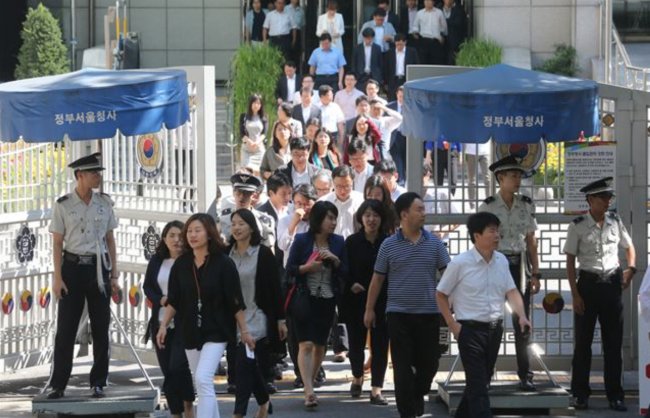Stricter code of conduct for public officials takes effect
By Kim So-hyunPublished : April 17, 2018 - 15:07
Under a revised code of conduct that took effect Tuesday, public officials are now required to report in advance all personal meetings with retired officials.
Civil servants must report to the head of their agency if they plan to play golf, travel, engage in other leisure activities or personally meet with a former colleague who has retired within the past two years.
This is to prevent any chance of granting privileges to retired public officials or colluding with them.
Those who violate the code of conduct will not face criminal punishment, but they will be subjected to disciplinary measures, ranging from being reprimanded to getting sacked.
The government expects the new code to help put an end to public officials’ abuse of authority, influence-peddling and corruption.
The tightened code of conduct forbids public officials from exerting their authority or influence to make junior colleagues or related agencies do personal tasks for them, or to solicit civilians.
Civil servants must report to the head of their agency if they plan to play golf, travel, engage in other leisure activities or personally meet with a former colleague who has retired within the past two years.
This is to prevent any chance of granting privileges to retired public officials or colluding with them.
Those who violate the code of conduct will not face criminal punishment, but they will be subjected to disciplinary measures, ranging from being reprimanded to getting sacked.
The government expects the new code to help put an end to public officials’ abuse of authority, influence-peddling and corruption.
The tightened code of conduct forbids public officials from exerting their authority or influence to make junior colleagues or related agencies do personal tasks for them, or to solicit civilians.

This includes soliciting for contributions, donations or investments; interfering in recruitments, promotions, transfers and disciplinary actions; demanding divulgence of trade secrets; as well as interfering in school admissions, grades and evaluations.
Civil servants are also barred from profit-seeking activities, such as being paid for offering consultation to companies, and having their family members hired by their agencies or affiliated agencies.
Under the revised code of conduct, public officials must report to the head of their agency if they or their family members engage in any monetary or asset transactions with people related to their duties.
They must also report if they are assigned to projects related to corporations or groups where their relatives work or own a stake.
A new regulation prohibits senior officials and their family members from signing any private contracts with the agencies they are working for or affiliated agencies.
Another new regulation requires those appointed to positions of vice ministerial level or above to submit a record of their activities in the civilian sector for the past three years.
The Anti-Corruption & Civil Rights Commission tightened the code of conduct, following a series of scandals last year involving civil servants’ abuse of power, such as hiring irregularities at public institutions.
It is the 10th revision made to the code, which was first established in 2003 based on the anti-graft law.
The commission provided guidelines for public officials to help them fully comprehend the changes made to the code.
By Kim So-hyun (sophie@heraldcorp.com)



![[AtoZ into Korean mind] Humor in Korea: Navigating the line between what's funny and not](http://res.heraldm.com/phpwas/restmb_idxmake.php?idx=644&simg=/content/image/2024/04/22/20240422050642_0.jpg&u=)
![[Exclusive] Korean military set to ban iPhones over 'security' concerns](http://res.heraldm.com/phpwas/restmb_idxmake.php?idx=644&simg=/content/image/2024/04/23/20240423050599_0.jpg&u=20240423183955)



![[Graphic News] 77% of young Koreans still financially dependent](http://res.heraldm.com/phpwas/restmb_idxmake.php?idx=644&simg=/content/image/2024/04/22/20240422050762_0.gif&u=)
![[Herald Interview] Why Toss invited hackers to penetrate its system](http://res.heraldm.com/phpwas/restmb_idxmake.php?idx=644&simg=/content/image/2024/04/22/20240422050569_0.jpg&u=20240422150649)






![[Exclusive] Korean military to ban iPhones over security issues](http://res.heraldm.com/phpwas/restmb_idxmake.php?idx=652&simg=/content/image/2024/04/23/20240423050599_0.jpg&u=20240423183955)



![[Today’s K-pop] Ateez confirms US tour details](http://res.heraldm.com/phpwas/restmb_idxmake.php?idx=642&simg=/content/image/2024/04/23/20240423050700_0.jpg&u=)